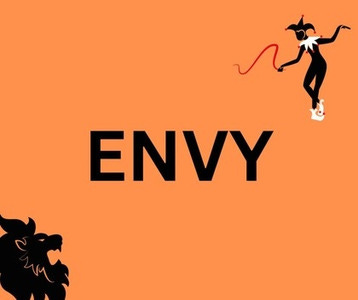We can own up to the other six sins (in small amounts obviously). We’ve all felt greedy, lazy, and angry; we’ve all overeaten and lusted after someone. But we can’t admit to envy.
When our friends win in some way – if they get the job, the soul mate, or the financial windfall, it can prompt our inner child to say, “But what about me?”.
We suppress this feeling. Our needy inner child is definitely not invited to the game of life.
When our enemies win, it gets even worse. The childish part of us goes from being upset or left out to feeling enraged. It’s amazing how many rags to riches stories of successful people have been fuelled by the energy of anger, “I’ll show them!”.
Even people who have everything they could possibly want display this pattern. Both Jeff Bezos and Richard Branson decided to spend a few of their billions going to space for ten minutes. Once Bezos announced the date of his trip, Branson rushed to bring forward the date of his launch so he could claim to do it first. A furious Bezos then set about diminishing this result by claiming that his rocket went higher, further, or longer.
It’s not enough to win, everyone else must fail.
Imagine if the people at the top of our current win/lose game spent their spare cash on healing the planet, instead of trying to escape from it.
You can’t help thinking that envy wasn’t too much of a problem in the old days because people didn’t have much to envy, which is why the Bible advised against “coveting your neighbour’s ox”.
The church leaders probably added Envy to the deadly list because they saw it as a Gateway Sin. After all, Cain envied his brother Abel… and ended up killing him.
In research studies, when people are asked to imagine situations in which they feel envious (for example, school reunions where old friends have become successful and attractive) the pain centres in their brains actually light up.
Envy triggers an onslaught of feelings of “I’m not enough”. These feelings aren’t allowed into the light of day… they must be sent underground to hide. It takes a lot of energy to keep things suppressed in the shadowlands, which is why Envy is such a massive Flow blocker.
The film Amadeus vividly portrayed envy in the contrast between Salieri and Mozart. The court musician Salieri yearned to be “touched by God” so that his music could become divine and immortal. The strategy he used to achieve this was hard work and diligence. He was highly competent, but inspiration eluded him because he wasn’t in Flow.
The young Mozart was his polar opposite – self-indulgent, immoral, and fun-loving. And yet he was in Flow, so composed an abundance of divine immortal music, seemingly with very little effort. It was a bitter blow for Salieri who interpreted this injustice as God bestowing gifts on the person who least deserved them.
Flow doesn’t reward obedience, it favours creative inspiration in the moment, rather than attachment to an outcome in the future.
If we’re in Flow we’re far less likely to envy someone else’s creative expression.
Now that the internet has levelled the playing field and anyone can become rich and famous, we’ve evolved from coveting someone’s ox to coveting someone’s opportunity.
In the old days we had the Cinderella model of opportunity – be good and patient (follow the rules) and a Fairy Godmother will transform you from a scullery maid into a princess.
This meant that if we remained a scullery maid our whole life, it wasn’t our fault. It was also quite likely… given the rarity with which magical beings made their appearance.
These days of course, (since the arrival of new age spirituality and their Law of Attraction), we all have magic within us (Fairy Godmothers for EVERYONE) therefore if we’re unsuccessful we can only blame ourselves.
This is a problem. Self-attack is always a problem.
When we see people who are untalented yet wildly successful, it feels unfair. We can’t vocalise this unfairness because that would look like ENVY, so we say nothing, but deep down we hope misfortune follows. This creates a disturbance in the force.
There is an upside to envy…
Envy can give us insight into our deepest longings. It allows us to notice what we have in seed form, so we can get excited about developing that, rather than comparing ourselves to whatever others have already created. We don’t envy people who don’t have the seed we’re carrying… a Bank Manager isn’t envious of a basketball player.
Envy can prompt us to question our belief that we are not good enough and point us in the direction of our talents, so that we can develop them. This is a better strategy than sitting on the couch waiting for a Fairy Godmother.
Envy can make us aware that there is a difference between special and unique. If we say “None of us are special” we can easily lose momentum. Our ego is likely to think “What’s the point in doing ANYTHING? Feeling special IS the reward”. On the other hand, if we say “All of us are unique” it means we can all win together.
Experiencing ourselves as unique ends envy, which is great… because envy is the worst kind of fuckery.
Summary
All seven of the deadly sins are rooted in duality thinking. If more is bad, less is good; if laziness is bad, work is good; if anger is bad, peace is good; if gluttony is bad, abstinence is good; if lust is bad, celibacy is good; if pride is bad, humility is good; if envy is bad, selflessness is good.
In the world of Flow, nothing is good or bad, it’s the driving energy that determines the outcome.




